
Hybrids
The Neanderthal Parallax series, book 3
Robert J Sawyer
For
Lloyd and Yvonne Penney
Wonderful Human Beings
The Sudbury Neutrino Observatory, Incos Creighton Mine, Laurentian University (including its Neuroscience Research Group), and York University all really exist. However, all the characters in this novel are entirely the product of my imagination. They are not meant to bear any resemblance to the actual people who hold or have held positions with these or any other organizations.
Acknowledgments and References
For anthropological and paleontological advice, I thank Michael K. Brett-Surman, Ph.D., and Rick Potts, Ph.D., both of the National Museum of natural History, Smithsonian Institution; Philip Lieberman, Ph.D., Brown University; Robin Ridington, Ph.D., Professor Emeritus, University of British Columbia; Gary J. Sawyer [no relation] and Ian Tattersall, Ph.D., both of the American Museum of natural History; Milford H. Wolpoff, Ph.D., University of Michigan, and the various experts listed in the Acknowledgments to my earlier book, Hominids.
For advice on genetics and disease, I thank George R. Carmody, Ph.D., Department of biology, Carleton University; Peter Halasz; Hassan Masum, a Ph.D. candidate at Carleton; Alison Sinclair, Ph.D.; and Edward Willett. For advice on the other medical matter that figures in the plot, I thank endocrinologist Christopher Kovacs, M.D., Health Sciences Centre, Memorial University of Newfoundland.
For information about and access to the Sudbury Neutrino Observatory, I thank Art McDonald, Ph.D., and J. Duncan Hepburn, Ph.D.
For drawing to my attention theories that human consciousness is an electromagnetic phenomenon, I thank Norm Nason. Two such theories, similar in most particulars, have recently and independently been developed by Johnjoe McFadden, Ph.D., School of biomedical and Life Science, University of Surrey, and Susan Pockett, Ph.D., Department of physics, University of Auckland. For those interested in reading more about them, McFadden presents a general account of his version in the closing chapter of his book Quantum Evolution: The New Science of Life (HarperCollins UK, 2000; W. W. Norton USA, 2001), and Pockett devotes her entire book The Nature of Consciousness: A Hypothesis (Writers Club Press, 2000) to her version of this theory.
There was much discussion in Humans, the previous book in this trilogy, about paleomagnetic evidence showing that Earths magnetic field has previously collapsed very rapidly. Since that research figures again in this book, I invite the curious to check the original study by Robert S. Coe and Michel Prvot, Evidence suggesting extremely rapid field variation during a geomagnetic reversal, in Earth and Planetary Science Letters, 92:29298 (1989), and the follow-up by Coe, Prvot, and Pierre Camps, New evidence for extraordinarily rapid change of the geomagnetic field during a reversal in Nature, 374:68792 (1995). For other advice related to magnetic reversals, I thank Grant C. McCormick and Ariel Reich, Ph.D.
Huge thanks to my lovely wife, Carolyn Clink; my editor David G. Hartwell and his associate Moshe Feder; my agent Ralph Vicinanza and his associates Christopher Lotts and Vince Gerardis; Tom Doherty, Linda Quinton, Jennifer Marcus, Jenifer Hunt, Irene Gallo, and everyone else at Tor Books; and Harold and Sylvia Fenn, Robert Howard, Heidi Winter, Melissa Cameron, David Leonard, Steve St. Amant, and everyone else at H. B. Fenn and Company.
Many thanks, also, to the friends and colleagues who let me bounce ideas off them or otherwise provided input, including Linda Carson, Marcel Gagn, James Alan Gardner, Al Katerinsky, Herb Kauderer, and Robert Charles Wilson. Beta testers for this novel were Ted Bleaney, Carolyn Clink, David Livingstone Clink, Richard Gotlib, Peter Halasz, Howard Miller, Ariel Reich, Alan B. Sawyer, Sally Tomasevic, Edo van Belkom, and David Widdicombe.
BARASTS
(Homo neanderthalensis)
GLIKSINS
(Homo sapiens)
The belief in God has often been advanced as not only the greatest, but the most complete of all the distinctions between man and the lower animals.
CHARLES DARWIN, The Descent of Man
And let me tell you, God is not so infinite as the Catholics assert. He is about six hundred meters in diameter, and even then is weak towards the edges.
KAREL CAPEK, The Absolute at Large
Mankind was still divided into two species: The few who had speculation in their souls, and the many who had none, with a belt of hybrids in the middle.
JOHN GALSWORTHY, To Let
My fellow Americansand all other human beings on this version of Earthit gives me great pleasure to address you this evening, my first major speech as your new president. I wish to talk about the future of our kind of hominid, of the species known as Homo sapiens: people of wisdom
Mare, said Ponter Boddit, it is my honor to introduce you to Lonwis Trob.
Mary was used to thinking of Neanderthals as robustSquat Schwarzeneggers was the phrase the Toronto Star had coined, referring to their short stature and massive musculature. So it was quite a shock to behold Lonwis Trob, especially since he was now standing next to Ponter Boddit.
Ponter was a member of what the Neanderthals called generation 145, meaning he was thirty-eight years old. He stood about five-eight, making him on the tall side for a male of his kind, and he had muscles most bodybuilders would envy.
But Lonwis Trob was one of the very few surviving members of generation 138, and that made him a staggering one hundred and eight years old. He was scrawny, although still broad-shouldered. All Neanderthals had light skinthey were a northern-adapted peoplebut Lonwiss was virtually transparent, as was what little body hair he had. And although his head showed all the standard Neanderthal traitslow forehead; doubly arched browridge; massive nose; square, chinless jawit was completely devoid of hair. Ponter, by comparison, had lots of blond hair (parted in the center, like most Neanderthals) and a full blond beard.
Still, the eyes were the most arresting features of the two Neanderthals now facing Mary Vaughan. Ponters irises were golden; Mary had found she could stare into them endlessly. And Lonwiss irises were segmented, mechanical: his eyeballs were polished spheres of blue metal, with a blue-green glow emanating from behind the central lenses.
Healthy day, Scholar Trob, said Mary. She didnt take his hand; that wasnt a Neanderthal custom. Its an honor to meet you.
No doubt it is, said Lonwis. Of course, he was speaking in the Neanderthal tonguethere was only one, so the language had no namebut his Companion implant was translating what he said, pumping synthesized English words out of its external speaker.
And what a Companion it was! Mary knew that Lonwis Trob had invented this technology when he was a young man, back in the year Marys people had known as 1923. In honor of all that the Companions had done for the Neanderthals, Lonwis had been presented with one that had a solid-gold faceplate. It was installed on the inside of his left forearm; there were few Neanderthal southpaws. In contrast, Ponters Companion, named Hak, had a plain steel faceplate; it looked positively chintzy in comparison.
Next page
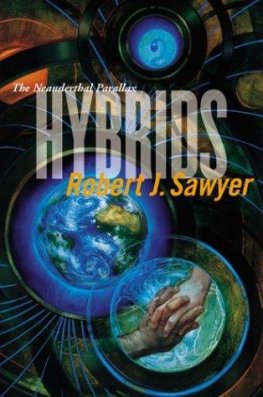
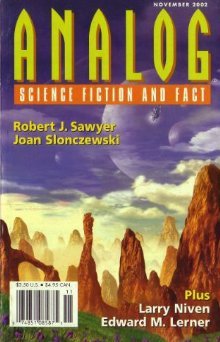
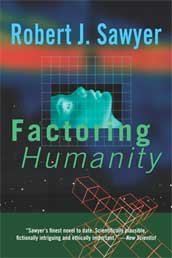

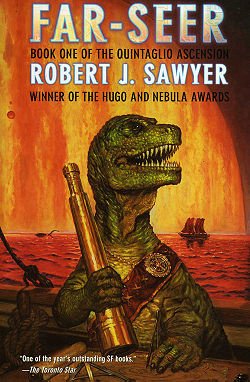

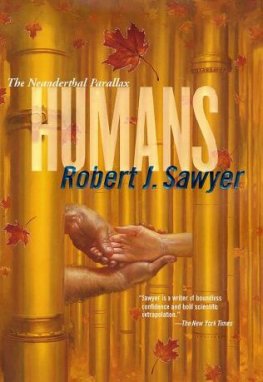


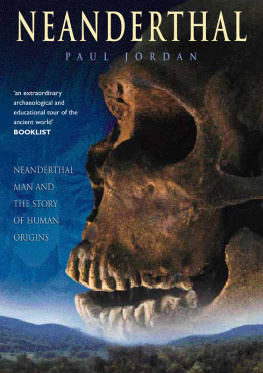
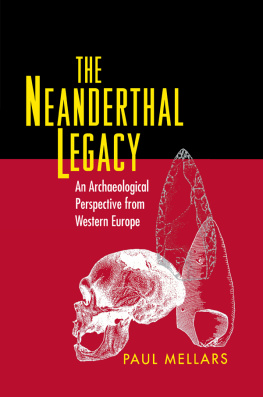
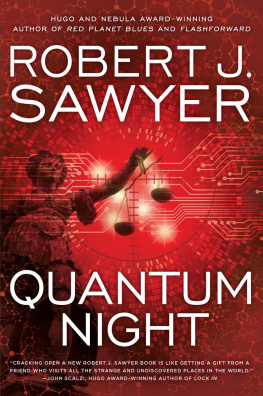
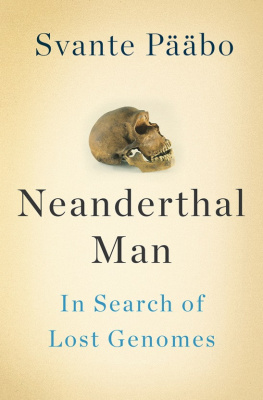
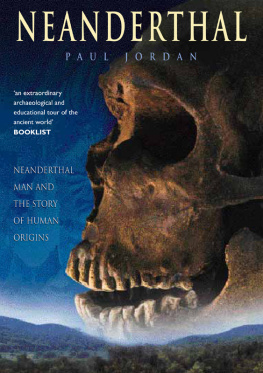
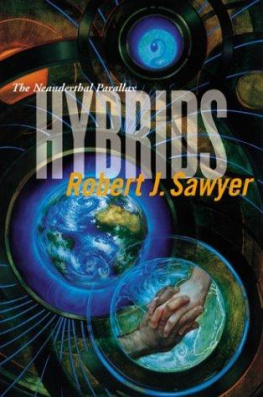
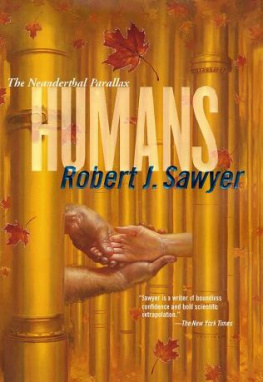
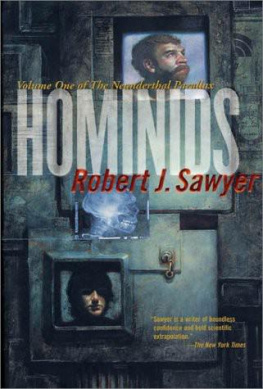

 GLIKSINS (Homo sapiens)
GLIKSINS (Homo sapiens)